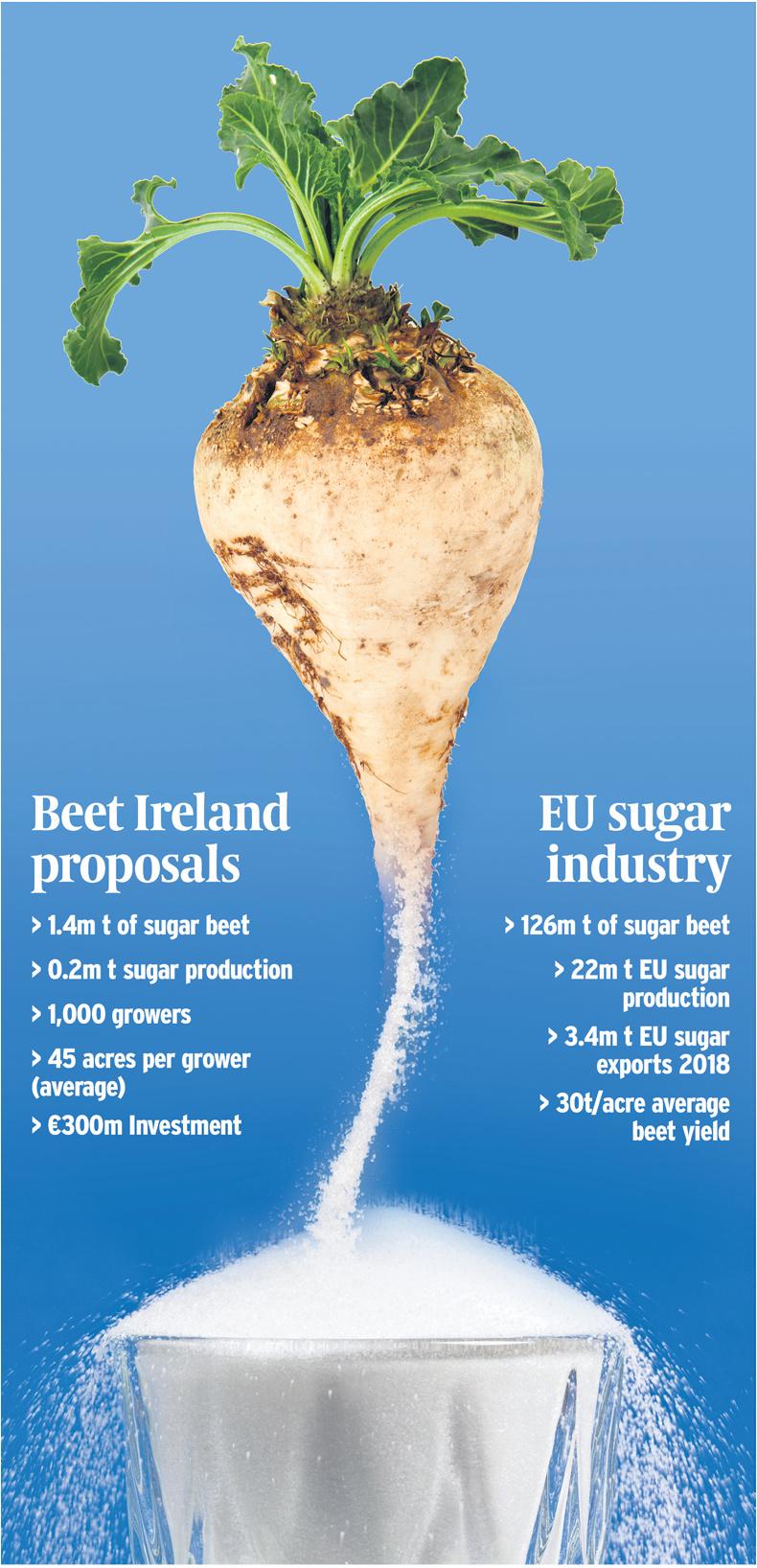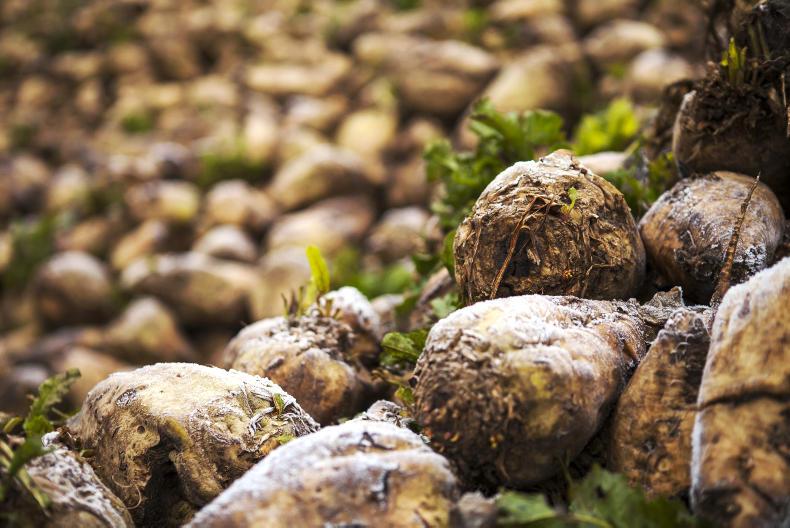In October 2017, the EU imposed quotas on sugar production were lifted which meant that Europe’s sugar growers could produce as much sugar beet as they wished- similar to what the lifting of dairy quotas meant for dairy farmers.
Almost immediately, European growers reacted to this market liberalisation and greatly expanded the area planted to sugar beet across Europe from 3.7m acres in 2016 to more than 4.3m acres in 2017.
This increase in sugar beet area has seen European sugar production surge by almost 25% in 2018 to hit close to 22m tonnes of (raw) sugar. This is around 4m tonnes more than was produced the previous year and has seen Europe move from being an annual importer of 3m tonnes of sugar to being a net exporter.

Europe (at 22m tonnes) is currently the world’s third-largest producer of sugar behind Brazil (34m tonnes) and India (33m tonnes), where sugar is mostly produced from cane and sold at world market prices that are lower than the historically protected internal market in Europe.
Today, the world market sugar price and demand are at three-year lows. It is expected that the world sugar market will remain in surplus for at least two seasons and possibly longer following a sharp rise in production, particularly in India and Thailand.
For example, over the last two years, the world market price for raw white sugar (London No 5) has fallen from highs of €500/t to lows of €300/t. World sugar prices are currently trading at €315/t.
However, EU sugar prices have historically traded much higher than world market sugar prices. This is as a result of production quotas and import tariffs under the EU sugar regime. While the production quotas are now gone, sugar imports into the EU for the most part are still subject to tariffs.
For example, Brazilian producers pay €98/t when they sell to the EU. If they exceed a set quota, this rises to the WTO level of €339/t.
Furthermore, EU rules allow least-developed countries (LDC), such as Cambodia, to export sugar to the EU tariff-free.
EU sugar prices
European sugar prices under the quota system peaked close to €800/t in 2013 but consistently traded between €450/t and €500/t during 2016 and 2017. However, since the end of quotas and the liberalisation of the market here, European sugar prices have begun to align more towards world market prices.
This has seen the European sugar price fall from around €450/t to lows of €347/t as recently as September this year. This is only a marginal premium on world market prices, which currently stand at €315/t. That gives an idea of the speed at which the European market is converging with the world market.
What profit is in growing beet?
While there are no costs available for the growing of sugar beet, we have taken Teagasc’s fodder beet costs and margins as a guide. Using this, the cost of growing an acre of fodder beet is now almost €800/acre. This leaves a margin before fixed costs of €119/acre on a 26t crop at €35/t, less than a 4t/acre winter barley crop. Realistically farmers need to budget for a price of around €25-30/t (based on current markets) and a yield of around 25-32t/acre. This means a best-case margin of around €170/acre, putting it somewhere around the level of winter barley. Like any crop, there are many variables in this calculation, from fertiliser prices and rates to potential yields and beet price. So this calculation serves only as a reference guide and a warning that the days of high profits in growing beet are long gone. It is a similar story when looking at margins in the UK.
Sugar beet yields
One of the important elements of profitable beet production is yield. While this was generally an unquantified variable in the past, it is reasonable to assume that average yields tended to be around 22-23t/ac with better fields doing 25t/ac plus. There is little doubt but that yield capacity has increased considerably over the past decade or so and a number of recent independent observations suggest that 32t/ac is achievable for sugar beet nowadays. In the UK, sugar beet yields have increased 25% over the last 10 years. UK growers achieve higher sugar beet yields than most of the EU, with the average yield level now at 31t/acre. However, it is unlikely that these yield levels will be reflected in farm averages here at the moment because high soil fertility is essential to achieving high beet yields and a big proportion of our land base is operating at below optimum fertility levels. – Andy Doyle
Sugar processing sector dominated by handful of players
When it comes to the sugar processing sector, Europe’s sugar industry is similar to many other sectors of agribusiness in that it is dominated by just a handful of players with significant economies of scale and market reach.
Across the EU, the price paid for sugar beet is based around contracts that are linked to the EU sugar price and the world market sugar price.
Tereos co-op (France) – 5.3m tonnes
The most transparent company in Europe’s sugar processing sector in terms of transparency when it comes to farmgate pricing structures, and by far the most comparable to what Beet Ireland is proposing, is French sugar company Tereos.
Owned by 12,000 growers, Tereos is a farmer co-op that purchased more than 20m tonnes of sugar beet last year and is now the second-largest sugar group in the world.
The co-op processed this sugar beet into 5.3m tonnes of raw sugar and generated sales of €5bn in the 2017-2018 marketing year. In true co-op fashion, Tereos has a profit margin of just 2% but still recorded hefty operating profits of €103m last year.
Tereos is a huge business with a net asset value of just under €7bn last year, although it has very high debt levels of €2.4bn. Preparing for the end of sugar quotas, the co-op has invested more than €500m in expanding and upgrading the nine sugar processing factories it owns in France alone. The co-op also has sugar refineries in South America, Asia, Africa and the rest of Europe.
In a bid to protect its farmer owners from the volatility and lower prices of the global sugar market, Tereos became the first sugar processor in Europe to guarantee growers a minimum price for sugar beet.
At the beginning of the 2017-2018 marketing year, Tereos set this guaranteed price for contracted sugar beet at €25/t for its co-op members for both the 2017-2018 and 2018-2019 growing seasons.
At the end of the 2017-2018 growing season, Tereos paid a final price of €28.40/t to growers for contracted beet, which comprised the base price of €25/t along with a €1.70/t dividend and a €1.70/t price support. Sugar beet supplied by growers that was over the contract was bought at €15.50/t by the co-op.
The total cost of the €1.70/t dividend payment and €1.70/t price support for Tereos came to €63m and resulted in the co-op recording a loss of €18m for its financial year.
The sharp fall in European sugar prices has since triggered a crisis at Tereos, with the co-op likely to record another loss in 2019 due to its high debts and with sugar prices so low.
Co-op management floated the idea in June this year of selling a stake in the business to an outside investor in order to generate cash and reduce debt. However, this has led to farmer backlash with a raft of farmer board members resigning in protest.
Other sugar giants
British Sugar (UK) – 1.4m tonnes
British Sugar is a division of Associated British Foods (ABF), a listed company on the London stock exchange that has diversified much of its business away from sugar and into food and clothes retailing. British Sugar produced almost 1.4m tonnes of raw sugar in 2017 and generated sales of just over £1.7bn (€2bn). The division generated profits of £123m (€138m) last year, while profit margins were just over 7%. Over 3,600 farms grow 8m tonnes of sugar beet and supply about 50% of the UK’s demand for sugar. British Sugar employs over 1,400 people and supports a further 9,500 jobs. In the last five years, it has invested over £250m in its plants, which are said to be among the most efficient in the world. This season, beet growers received a guaranteed price of £22.50 (€23) per tonne plus a market-linked bonus which gets triggered above an EU sugar price of €475/t. However, even if the EU sugar price hits €700/t, the maximum that a grower can receive is €30/t.
Sudzucker AG (Germany) – 6m tonnes
The largest sugar company in Europe is Sudzucker AG, which processed 36m tonnes of sugar beet last year into almost 6m tonnes of sugar. The company has operations all across Europe, but more than 75% of its sugar supply comes from four countries – Germany, France, Belgium and Poland.
The company’s sugar division had revenues of €3bn last year. Operating profits in the business increased to €139m for 2017, with profit margins healthy at 4.6%.
Nordzucker AG (Germany) – 2.7m tonnes
Nordzucker AG, another German company, buys 17m tonnes of sugar beet from growers across Europe. This beet is processed into almost 3m tonnes of raw sugar every year. The company has annual sales of €1.7bn and made profits of €154m in 2017. Profit margins in the business were over 9% last year.
Comment
The easy profits from growing sugar beet appear to be gone. The EU sugar price today carries a premium of less than 10% on the world price. Outside the sugar regime, life for beet growers has become increasingly uncertain and volatile, where the industry is now living in a true commodity market environment.
Despite being a farmer owned co-op, French sugar company Tereos tried to shelter its growers from the volatility of world markets by supporting sugar beet prices. However, in the first year post sugar quotas the co-op has already run into financial difficulty.
Under the Beet Ireland proposals, Ireland will produce less than 1% of total EU sugar production. This means that any sugar plant will have to be highly efficient to compete with the sugar giants in Europe.










SHARING OPTIONS